-
About
- About Listly
- Community & Support
- Howto
- Chrome Extension
- Bookmarklet
- WordPress Plugin
- Listly Premium
- Privacy
- Terms
- DMCA Copyright
- © 2010-2025 Boomy Labs

Listly by Umbrella Health Care Systems
Mumps, measles, rubella, and chickenpox are infectious diseases that may occur during childhood. Children are more likely to be infected as they haven’t yet developed immunity to them and they tend to gather in groups and come into closer contact with each other. They are also generally not as good with some aspects of hygiene as adults.
https://www.umbrellamd.com/e-visit

A doctor can test to see if you have it, but there’s not much they can do after that. Time and rest are the only remedies. Mumps can cause fever, muscle aches, and swollen glands in your cheeks and under your jaw. Stay away from other people for at least a week to avoid spreading it. The MMR (measles-mumps-rubella) vaccine can prevent it.
https://www.umbrellamd.com/e-visit
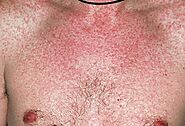
This can bring on a high fever, rash, runny nose, pink and watery eyes, coughing, diarrhea, and earache. You can protect yourself against it with the MMR vaccine. That’s extra important if you travel to places where it’s more common.
https://www.umbrellamd.com/e-visit

These tiny insects feed on blood from your scalp. Gross and disturbing? Yes. But also pretty harmless, since they don’t carry diseases. Anyone can get head lice, but adults get it less often because a layer of acid develops on your scalp to help protect you.
https://www.umbrellamd.com/e-visit
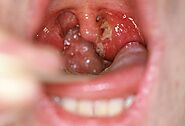
A sore throat usually goes away on its own, but if it’s strep, you'll probably need antibiotics, used mainly to relieve symptoms and prevent complications. Your doctor will take a swab of your throat to see if you have it. Though it's most common in kids, adults get it, too. It can cause fever, nausea, vomiting, and swollen tonsils. Best way to avoid it? Wash those hands.
https://www.umbrellamd.com/e-visit
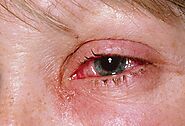
You doctor might call this conjunctivitis. It can cause itchy, irritated, and burning eyes, sensitivity to light, and crust on your eyelids. It usually gets better on its own, but it’s highly contagious, so see a doctor. To keep it from spreading, wash your hands often and don’t touch your eyes.
https://www.umbrellamd.com/e-visit

This bacterial disease is also called pertussis, and it’s most contagious before coughing starts. Babies have the highest rate of whooping cough-related deaths, and they often get the condition from siblings, parents, and grandparents. A vaccine is the best way to prevent it.
https://www.umbrellamd.com/e-visit
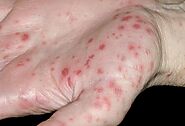
It's most common in kids under 5, and it usually isn’t serious. Symptoms can include fever, sore throat, and lack of appetite, followed by sores in your throat and a rash on your hands and feet. Adults don’t always have symptoms, but they can still pass the virus on. It usually clears up without treatment in 7 to 10 days.
https://www.umbrellamd.com/e-visit
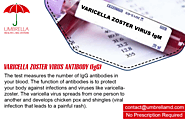
Does this test have other names?
IgG ELISA, The Chickenpox test, Serum varicella IgG levels, herpes zoster test, varicella-zoster virus antibody, Chickenpox-shingles test
What is a varicella-zoster virus IgG antibody test?
The test measures the number of IgG antibodies in your blood. These antibodies are proteins produced by the immune system. The function of antibodies is to protect your body against infections and viruses like varicella-zoster. The varicella virus spreads from one person to another and develops chicken pox and shingles (viral infection that leads to a painful rash).
Varicella (Chickenpox) is a small red pimple or sore on your skin. You may also have fatigue and fever. If people get infected first time in their life with the varicella-zoster virus, they experience chickenpox. After chickenpox, many people get immune to the virus, and then it does not appear to them for the rest of their life. The first illness or sign may secret the virus in nerves in your body. The virus may become active in your life in later stages, which leads to a painful rash known as shingles (herpes zoster).
What is the purpose of the test?
The test indicates the number of IgG antibodies in your blood against the varicella-zoster virus. These antibodies develop by the late response to the virus results. They are present in the blood for long life. IgG antibodies can show any late stages of the infection or if you have developed immunity against the virus.
The varicella-zoster virus IgG test identifies any infection in a person that may develop in the past or in recent times with chickenpox. The antigen-antibody binding helps to differentiate the previously produced immunity and the current infection.
People have a high attraction for antigen-antibody binding if they have had already experience infection. A low affinity for antigen-antibody binding show that recently infected people with the virus.
When do you need the test?
Your provider may recommend the varicella-zoster IgG antibody test to see if you are likely to experience varicella-zoster virus in your body. It can help your healthcare provider because they may work with those patients who have already experienced the virus.
There are two stages of the varicella virus primary viremia and secondary viremia. The virus infects those immune cells found in the liver and spleen in primary viremia. T-cells are affected in secondary viremia. The signs and symptoms of chickenpox appear when the stage of secondary viremia begins.
The test may also help your provider to determine the presence of chicken pox if the diagnoses are inaccurate. Signs and symptoms of chickenpox include
Headache
Sore throat
Fever
Loss of appetite
Weaknesses
The appearance of different rashes a day or two before the other symptoms
The rash can stay up to two weeks on your skin. Varicella virus spreads by flowing through the skin lesions till all the lesions get crusted over. Different types of bumps appear at different stages on your overall body.
You may also experience these general symptoms, which include
Large red and pink flat spots or pimples increase with time.
Skin lesions on the face, trunk, and scalp that grow in stages.
Vesicles (sacs) filled with fluid.
The sores get crusty and scab over in a short time.
What happens during the test?
Your provider needs a blood sample. A needle injects into a vein in your arm. A small amount of blood collects in the test tube. Your provider applies a bandage to your vein. The blood sample goes to the laboratory to observe IgG antibodies. People can return to their homes for daily activities. The test usually takes at least 5 minutes. You can order the virus test online at UmbrellaMD.
How do I get ready for the test?
You may not need to prepare for this test. You can inform your healthcare provider about specific medicines, vitamins, and supplements that you are taking.
What other tests may I need to take along with this test?
You do not need any additional tests.
What are the risks involved in the test?
A blood test has a small risk. You may experience pain when the needle injects into your vein. Some bleeding may also occur.
You can talk with your doctor if you have experience:
Fainting or dizziness
Leakage from the needle spot
Excessive Bleeding
Fever
What may affect the test result?
People having a history of chickenpox or a vaccine against the disease may alter your test results.
What does the test result mean?
The test results depend on the person’s age, gender, medical history, and other factors. The test results may be a little varying on the laboratory you used. It is not a big concern. You can ask your healthcare provider what your test results mean.
Positive test results for varicella-zoster virus IgG antibody may indicate a few possible conditions.
Your provider uses the test results to observe the risk of developing an infection. When your provider identifies the varicella-zoster immunoglobulin G (IgG) antibodies in your blood, it indicates you are immune to the virus. If you already have had a chickenpox infection or immunization occurred successfully in your body.
If your healthcare provider detects that you have experience chickenpox, you may be infected with the varicella-zoster virus due to the increasing IgG levels for several weeks. In this case, your provider only conducts the test to confirm the diagnosis after the complete examination.
Your provider will recommend some antiviral medications after diagnosis. You can prevent complications if you start the treatment on time. The virus often recovers in about two weeks.
Visit Umbrella Health Care Systems to get detailed information about the result of the macroscopic urinalysis test. It is online healthcare that helps you to solve your health problems. You can book the lab test if you do not have a prescription. We aim to provide better services, including e-consultation, medical imaging, pharmacies, and lab tests. You can get treatment by sitting at home. Register here to learn more about us, and if you have any queries, you can write us.
https://www.umbrellamd.com/e-visit
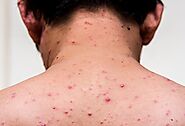
Fever, headache, and a couple hundred itchy blisters will let you know you have it. Kids under 15 get it most often -- but adults get it, too, and their symptoms can be worse. A chicken pox vaccine is the best way to prevent it. Serious cases can lead to dehydration, pneumonia, and even brain infections, so call your doctor if you think you might have the chicken pox.
https://www.umbrellamd.com/e-visit

Umbrella Health Care Systems provide complete solution for health related problems.
https://www.umbrellamd.com/